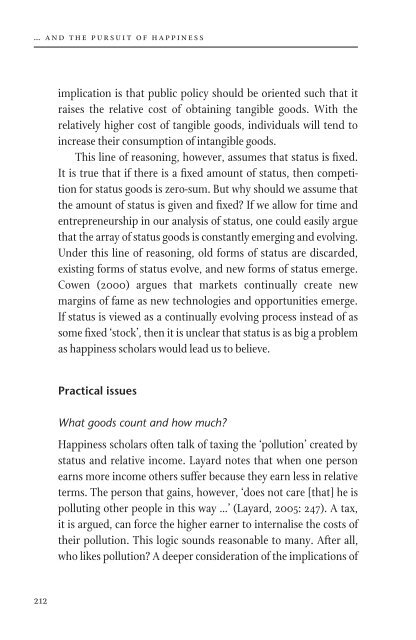… and the Pursuit of Happiness - Institute of Economic Affairs
… and the Pursuit of Happiness - Institute of Economic Affairs
… and the Pursuit of Happiness - Institute of Economic Affairs
You also want an ePaper? Increase the reach of your titles
YUMPU automatically turns print PDFs into web optimized ePapers that Google loves.
<strong>…</strong> <strong>and</strong> <strong>the</strong> pursuit <strong>of</strong> happiness<br />
lessons <strong>the</strong> from unbearable austrian lightness <strong>and</strong> public <strong>of</strong> choice happiness economics policy<br />
implication is that public policy should be oriented such that it<br />
raises <strong>the</strong> relative cost <strong>of</strong> obtaining tangible goods. With <strong>the</strong><br />
relatively higher cost <strong>of</strong> tangible goods, individuals will tend to<br />
increase <strong>the</strong>ir consumption <strong>of</strong> intangible goods.<br />
This line <strong>of</strong> reasoning, however, assumes that status is fixed.<br />
It is true that if <strong>the</strong>re is a fixed amount <strong>of</strong> status, <strong>the</strong>n competition<br />
for status goods is zero-sum. But why should we assume that<br />
<strong>the</strong> amount <strong>of</strong> status is given <strong>and</strong> fixed? If we allow for time <strong>and</strong><br />
entrepreneurship in our analysis <strong>of</strong> status, one could easily argue<br />
that <strong>the</strong> array <strong>of</strong> status goods is constantly emerging <strong>and</strong> evolving.<br />
Under this line <strong>of</strong> reasoning, old forms <strong>of</strong> status are discarded,<br />
existing forms <strong>of</strong> status evolve, <strong>and</strong> new forms <strong>of</strong> status emerge.<br />
Cowen (2000) argues that markets continually create new<br />
margins <strong>of</strong> fame as new technologies <strong>and</strong> opportunities emerge.<br />
If status is viewed as a continually evolving process instead <strong>of</strong> as<br />
some fixed ‘stock’, <strong>the</strong>n it is unclear that status is as big a problem<br />
as happiness scholars would lead us to believe.<br />
Practical issues<br />
What goods count <strong>and</strong> how much?<br />
<strong>Happiness</strong> scholars <strong>of</strong>ten talk <strong>of</strong> taxing <strong>the</strong> ‘pollution’ created by<br />
status <strong>and</strong> relative income. Layard notes that when one person<br />
earns more income o<strong>the</strong>rs suffer because <strong>the</strong>y earn less in relative<br />
terms. The person that gains, however, ‘does not care [that] he is<br />
polluting o<strong>the</strong>r people in this way <strong>…</strong>’ (Layard, 2005: 247). A tax,<br />
it is argued, can force <strong>the</strong> higher earner to internalise <strong>the</strong> costs <strong>of</strong><br />
<strong>the</strong>ir pollution. This logic sounds reasonable to many. After all,<br />
who likes pollution? A deeper consideration <strong>of</strong> <strong>the</strong> implications <strong>of</strong><br />
taxing relative increases in income, however, should make one at<br />
least somewhat sceptical <strong>of</strong> <strong>the</strong>se policy implications.<br />
To underst<strong>and</strong> why, consider what taxing <strong>the</strong> ‘pollution’<br />
created by increases in relative income would actually mean.<br />
Taken literally, it would mean that all productive entrepreneurial<br />
activity would need to be taxed since it leads to an increased<br />
income for <strong>the</strong> entrepreneur. The economics <strong>of</strong> pr<strong>of</strong>it <strong>and</strong> loss<br />
indicate that pr<strong>of</strong>its result when an alert entrepreneur combines<br />
resources in a manner that customers value. This is why customers<br />
are willing to turn over <strong>the</strong>ir money for <strong>the</strong> good or service. A tax,<br />
however, is a means <strong>of</strong> discouraging an activity. A tax on productive<br />
entrepreneurship would lead to fewer productive activities<br />
which would make people worse <strong>of</strong>f by reducing innovation <strong>and</strong><br />
positive-sum interactions. Even if productive entrepreneurial<br />
activities do generate costs in terms <strong>of</strong> ‘pollution’ by increasing<br />
relative incomes, this cost must be weighed against <strong>the</strong> benefits<br />
in terms <strong>of</strong> increased wealth <strong>and</strong> all that comes with it – higher<br />
st<strong>and</strong>ards <strong>of</strong> living, better education, lower levels <strong>of</strong> disease, less<br />
infant mortality, etc. (Lee, 2005). Given that future entrepreneurial<br />
activities cannot be known or measured, it is unclear how<br />
one would carry out such an analysis in any meaningful way.<br />
Proponents <strong>of</strong> a ‘happiness tax’ on productive activities may<br />
claim that this is unreasonable. They may claim that <strong>the</strong>y do not<br />
want to tax all activities, but instead just certain luxury items<br />
<strong>and</strong> high-status activities. But how are <strong>the</strong>se luxury <strong>and</strong> status<br />
items to be determined <strong>and</strong> weighted in practice? Should only<br />
for-pr<strong>of</strong>it activities be taxed? What about non-pr<strong>of</strong>it opportunities<br />
such as <strong>the</strong> Gates Foundation, which lead to status in <strong>the</strong><br />
world <strong>of</strong> philanthropy? What about medical research aimed at<br />
curing disease? After all, discovering a cure for a disease is surely<br />
212 213












